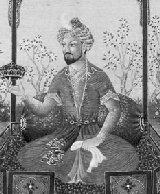






 |
 |
Русский
English |
||||
 |
 |
 |
 |
 |
||
 |
Lectures > Parables and legends |
 |
|
Our works:
The study:
|
Akbar the Great 
THE SILVERY MESSENGER Beneath a tree Akbar beheld a vision. To him suddenly appeared a Silvery Messenger, who said, “For the first time and the last time thou here beholdest Me, as if I never appeared. Thou shalt build a Kingdom and in it a future Temple. And as a Ruler thou shalt traverse the field of life, bearing within thy spirit the future Temple. “Verily, long hast thou traveled the path of God. It is need to end the earthly way. Thou shalt not hear My Voice. Nor shalt thou see My Light. And thou shalt guard thy readiness to walk the way of God. “But when approaches the hour to unbar the next Gates, thy wife, ordained to thee by God, shall hear My Knock and shall say, ‘He is at the Gates.’ “But thou shalt see Me only on the crossing of the border. And when thy wife shall enter the final way she shall behold thee in My Image. And thou, be a king on earth, and thereafter the landlord. And when thou endest thy earthly way encircle the fields of thy garden. Each departing one shall leave no crumbs upon the festal board. Traverse each overgrown path and remember: the nearer, the further. First in storm, then in gale, then in silence!” Then the Messenger became illumined with a silvery glow and the leaves upon the trees became translucent as rainbows. And thereafter the air trembled. Then all became as before. Akbar saw nothing ever again. When the hour of liberation arrived, he and his wife rejoiced that another date was approaching, the ordained date. For there exists no death. THE HELP OF HEAVEN The Ruler was convinced that at each difficult hour the help of heaven would come to him. Time came to declare war against the Princes of Golconda and the Ruler was perplexed over his decision. As the eye of the Ruler wandered over the floor he saw an ant bearing a great load. And the ant endured it long. Finally Akbar exclaimed, “Why should one beset oneself with the burden of Golconda!” And he gave his command to cease preparations for the march. Another time the Ruler attended a Court and wished to take part in pronouncing verdict. But his attention was drawn to the trembling of a butterfly, which beat its wings against the window. And he forgot the word that he had crystallized and thought, “Let the judges fulfil their duty,” remarking aloud, “To-day I am only a guest here.” And the verdict was justly merciful. * * * Enemies made attempts against the life of Akbar. An assassin stood ready behind a tree in the garden where the Ruler was walking alone. A black serpent crawled across the path and the Ruler turned back to summon his servants. Seeking for the serpent they discovered the assassin behind the tree. Then the Ruler said, “The help of heaven crawls over the earth. Let only the eye and ear be open.” THE COMMANDERS Of the two commanders of Akbar: One commander received most explicit indications; the other only the most fragmentary ones. Finally the latter addressed Akbar, saying, “Why have I not deserved explicit commands when I gathered so many victories?” Akbar replied, “Your understanding restrained the flow of words. Let each moment saved by you be commemorated with the most precious pearl.” Therefore, surpassing is the joy of those who can understand, saving the draught of the source. Let us add about the third commander. He asked, “Why are tardiness and prematurity equally condemned?” Akbar replied, “My friend, there are no equal values. Hence, if prematurity comprises resourcefulness, its merit is greater because tardiness is linked only with death. Prematurity is to be adjudged; but tardiness is already condemned.” Surrounded and threatened, Akbar addressed his commanders: “The less agitated is the substance, the more clear is the reflection of the summits.” After inspecting his army, Akbar said: “A fourth part is already achieved. I have seen satisfied people. The rest we shall see after a day of heat, after a day of rain, after a sleepless night.” ENEMIES Akbar, called Great, regarded his enemies with care. His beloved councilor kept a list of enemies. Akbar often inquired, “Has not some worthy name found its way to the list? When I see a worthy name I shall send my greeting to a friend in disguise.” And Akbar further said, “I rejoice that I could apply the sacred Teaching in life, that I could give to people of plenty, and that I was shaded by great enemies.” Thus spoke Akbar, knowing the value of enemies. During the assaults of his enemies Akbar was asked why there were so many attacks. Akbar replied, “Allow to the enemies moments of being occupied with something.” INVISIBLY VISIBLE The Court Historian of Akbar once said to the Ruler, “Among potentates I observed an insoluble problem. Certain rulers held themselves unapproachable, aloof from the people. These were deposed because of their futility. Others entered into the daily lives. People became used to them and deposed them for being commonplace.” Akbar smiled. “That means that a Ruler must remain unseen, but entering and directing all actions.” Thus ordained the wise Ruler, foretelling thereby the future. Invisibly visible! P.S. Dear reader, your questions and commentaries can be sent to our e-mail: cdk-zp@rambler.ru. We will certainly look through them and try to reply you. |
Our partners:
The Three Values:
Our e-mail:
|
 |
Lectures > Parables and legends |
 |